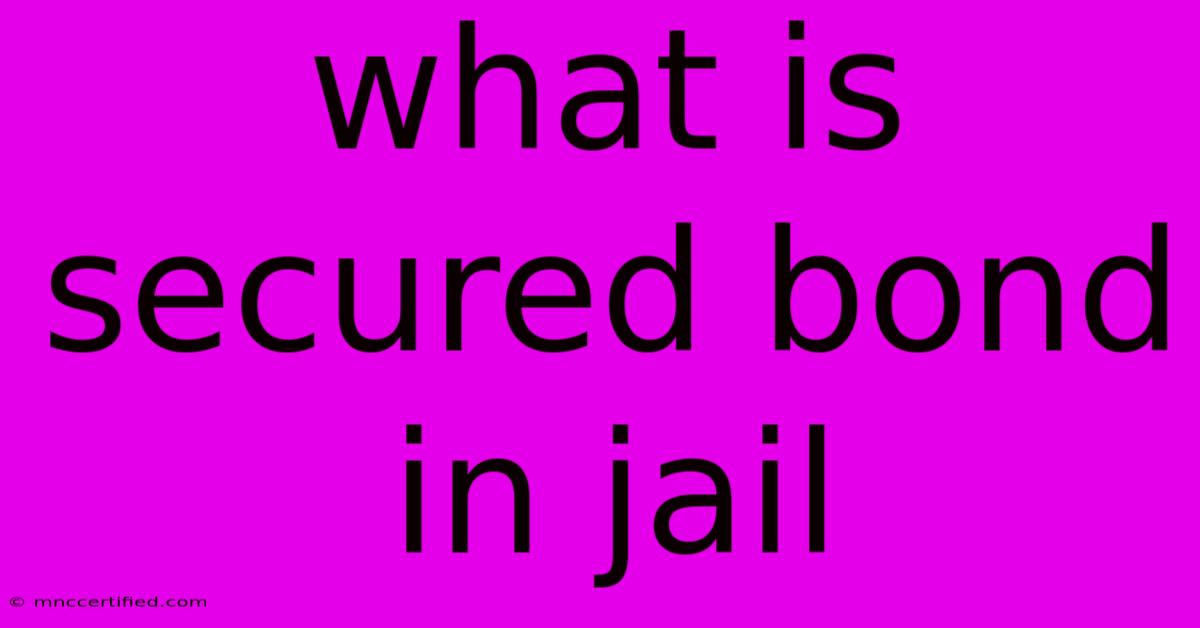What Is Secured Bond In Jail

Table of Contents
What is a Secured Bond in Jail? Understanding Your Bail Options
Getting arrested and facing jail time is a frightening experience. One of the first things you'll likely encounter is the bail process, and understanding your options is crucial. This article will focus specifically on secured bonds, explaining what they are, how they work, and what to expect.
What is a Bail Bond?
Before delving into secured bonds, let's establish a foundational understanding of bail bonds in general. A bail bond is a financial agreement that allows a defendant to be released from jail while awaiting trial. It's essentially a promise to appear in court for all scheduled hearings. If the defendant fails to appear, the bond is forfeited.
There are several types of bail bonds, including:
- Unsecured Bonds: These don't require a monetary deposit upfront. However, if you fail to appear in court, you'll be responsible for the full bond amount.
- Secured Bonds: This is the type we'll focus on in this article. It requires a monetary deposit, typically a percentage of the total bond amount.
- Surety Bonds: These involve a third-party bail bondsman who posts the bond on your behalf for a fee.
Understanding Secured Bonds: A Detailed Explanation
A secured bond requires you (or a co-signer) to deposit a specific amount of money with the court. This deposit acts as collateral, guaranteeing your appearance in court. The amount required is determined by the judge and is based on several factors, including the severity of the crime, your criminal history, and the likelihood of you fleeing.
Key features of a secured bond:
- Monetary Deposit: You must deposit a specific sum of money with the court. This money is held until the case is resolved.
- Collateral: The deposited money serves as collateral. If you appear for all court dates, this money is returned to you.
- Forfeiture: If you fail to appear in court, the court keeps your deposit.
- Conditions: The judge may impose additional conditions, such as regular check-ins with a probation officer or restrictions on travel.
How Secured Bonds Work in Practice
The process typically involves:
- Arrest and Arraignment: After arrest, you'll be brought before a judge for an arraignment hearing.
- Bail Setting: The judge will set a bail amount. This might be a secured bond, an unsecured bond, or another type of bail.
- Deposit: If a secured bond is set, you'll need to deposit the required amount with the court. This can be done in cash, cashier's check, or other acceptable forms of payment.
- Release from Jail: Once the deposit is made, you'll be released from jail.
- Court Appearances: You are legally obligated to appear for all scheduled court hearings.
- Bond Return: If you fulfill all court obligations, your deposit is returned to you at the conclusion of your case.
Secured Bonds vs. Other Bail Options: Which is Right for You?
Choosing the right bail option depends on your individual circumstances and financial situation. Compare secured bonds with other options like:
- Unsecured Bonds: Offer freedom without an upfront deposit, but carry a high risk of forfeiting a substantial sum if you miss court.
- Surety Bonds: A bail bondsman posts the bond for a fee, but you typically pay a percentage of the bond amount. This can be helpful if you lack the funds for a secured bond.
Frequently Asked Questions (FAQs)
Q: What happens if I can't afford a secured bond? You may need to explore options like seeking legal aid, contacting family or friends for financial assistance, or considering a surety bond.
Q: Can I use property as collateral for a secured bond? This depends on the court's policies. Some courts might accept property as collateral, but it's essential to clarify this with the court.
Q: What happens if I violate the conditions of my secured bond? Violation of the bond's conditions could lead to the forfeiture of your deposit and a warrant for your arrest.
Navigating the Secured Bond Process: Seeking Legal Counsel
Navigating the legal system can be complex. If you're facing a secured bond, consulting with an experienced criminal defense attorney is strongly recommended. They can advise you on the best course of action, help you understand your rights, and represent you in court. This is particularly crucial if you're unsure about the implications of a secured bond or are facing serious charges. Remember, understanding your options and seeking professional legal help are crucial steps in handling your case effectively.

Thank you for visiting our website wich cover about What Is Secured Bond In Jail. We hope the information provided has been useful to you. Feel free to contact us if you have any questions or need further assistance. See you next time and dont miss to bookmark.
Featured Posts
-
Does Bondo Stick To Aluminum
Nov 30, 2024
-
James Bond Theme Sheet Music
Nov 30, 2024
-
Colorado Football Hunters Impressive Stats
Nov 30, 2024
-
15 Best Apple Deals Black Friday 2024
Nov 30, 2024
-
Watch Wisconsin Vs Minnesota Live Stream Tv
Nov 30, 2024